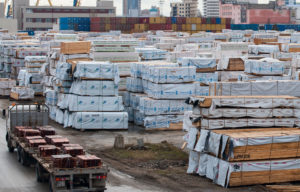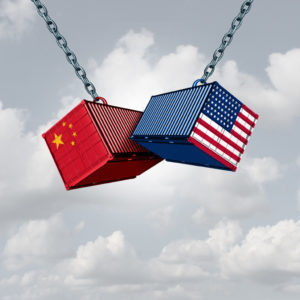News & Insights
Did You Miss These Recent Significant Export and Sanctions Regulatory Developments?
The following provides a snapshot of recent regulatory export and sanctions developments in case you happened to miss these key news items:
OFAC Sanctions Key Players in Iran’s Oil Sector
On October 26, 2020, the Treasury Department’s Office of Foreign Assets Control (OFAC) added several individuals, entities and vessels to the Specially Designated Nationals (SDN) List, including Iran’s Ministry of Petroleum, the National Iranian Oil Company (NIOC), and the National Iranian Tanker Company, for operating in Iran’s oil sector and supporting the Islamic Revolutionary Guard in violation of the U.S. economic sanctions. OFAC also added several people to the SDN list for their involvement in sales of Iranian gasoline to the Government of Venezuela. U.S. persons are prohibited from dealing, directly or indirectly, with SDNs without prior OFAC authorization.
OFAC Prohibits Remittance-Related Activities Involving Entities on the Cuba Restricted List
On October 23, 2020, OFAC amended the Cuban Assets Control Regulations in 31 C.F.R. Part 515 by removing entities or sub-entities designated on the State Department’s Cuba Restricted List from the scope of authorized remittance-related activities. Where such entities are involved in remittance transactions (including Financiera Cimex or FINCIMEX), the General Licenses in Sections 515.50, 515.572(a)(3) and 515.587 cannot be utilized. The new rules take effect on November 26, 2020. See 85 Federal Register 67988 (October 23, 2020) for further details.
OFAC Imposes Sanctions for Interference in US Elections, Support of International Terrorism and Attempts to Destabilize Iraq
On October 22, 2020, OFAC imposed sanctions on certain Hizballah officials, the Iranian ambassador to Iraq and other Iranian entities for their continued support of international terrorism, attempts to destabilize Iraq and interference in U.S. elections. With respect to the latter, the sanctions targets were found to be publishing disinformation online intended to mislead U.S. voters and sow discord. The individuals and entities were added to the SDN List As noted above, US persons are prohibited from dealing with SDNs without prior OFAC authorization.
Directorate of Defense Trade Controls Expected to Publish ITAR Reorganization Rules Very Soon
The State Department’s Directorate of Defense Trade Controls (DDTC) is reportedly very close to publishing the first of several rules that will effectively reorganize the International Traffic in Arms Regulations (ITAR). Once the rules are published, DDTC will provide a 180-day implementation period to give industry time to acclimate to the modifications. The first rule is expected to address the layout (but not the meanings) of definitions in the ITAR.—the goal is to move all of the definitions to one section within the ITAR. Subsequent rules will consolidate all of the exemptions into on location within the ITAR, as well as rework licensing requirements. DDTC is also currently working on an end-to-end encryption rule similar to what the Bureau of Industry and Security (BIS) rolled out under the Export Administration Regulations (EAR) (in which the sending, taking or storing of EAR-controlled technology and software will not be considered an export where the transmission involves unclassified information and software, is encrypted end-to-end, meets certain cryptographic standards, and is not intentionally stored in Country Group D:5 or Russia).
US and Brazil Sign Protocol Relating to Trade Rules and Transparency
On October 19, 2020, the United States and Brazil signed a Protocol Relating to Trade Rules and Transparency with three new annexes that address customs administration and trade facilitation, good regulatory practices, and anticorruption.
Annex I covers:
- Online publication of customs and other border information;
- Requirements related to customs brokers and procedures to correct errors;
- The rollout of a single window for import, export and transit;
- Electronic systems for traders including submission of customs documentation;
- Acceptance of electronic documents (e.g., e-Phyto phytosanitary certificates);
- Joint work plan to advance AEO mutual recognition agreement;
- Promotion of appropriate border treatment for goods vulnerable to deterioration;
- Advance rulings on classification, value, origin, and quotas;
- Mechanisms to help ensure consistent customs treatment from port to port;
- Prohibition on consular transactions in connection with importation;
- Disciplines on penalties, including no penalties on minor errors;
- Procedures to allow correction of errors without penalties.
- Expanded customs cooperation, including on trade enforcement
Annex II will provide greater transparency about Brazilian regulatory procedures, including:
- Online publication of draft rules, comment periods, and consideration of comments;
- A website on regulations in development and regulators’ specific responsibilities;
- Use of a Regulatory Impact Assessment to evaluate draft regulations;
- Review of regulations for effectiveness and identify opportunities to reduce burdens;
- Transparency about the source of information used by regulators;
- Recognition of advisory groups, public notice of membership and activities.
Annex III covers the parties’ anti-corruption and anti-bribery commitments:
- Measures to prevent and combat bribery and corruption;
- Provisions to preclude the tax deductibility of bribes;
- Establishment of measures for the recovery of proceeds of corruption;
- Denial of a safe haven for foreign public officials that engage in corruption;
- Effective, persuasive sanctions for corrupt acts;
- Rules for integrity in maintaining financial records;
- Procedures to report corrupt acts, and protection for whistleblowers;
- Policies and procedures to promote accountability of public officials;
- Participation of public sector in the prevention and combat of bribery and corruption.
Bureau of Industry and Security Offers Six-Month Extension of Licenses Due to COVID-19
On October 17, 2020, the Commerce Department’s Bureau of Industry and Security (BIS) issued a notice giving exporters an option to request a six-month extension of their licenses as a result of the ongoing pandemic. The extensions are intended to give more time to exporters who may not have been able to ship orders as a result of resource constraints caused by COVID-19. Licenses that qualify for the extension are those that are scheduled to expire on or before December 31, 2020. The BIS further stated that, in most cases, such extensions will be granted. Extension requests should be submitted via email to LicenseExtensionRequest@bis.doc.gov. The BIS should respond to requests within two or three business days.
Trump Administration Issues National Strategy for Critical and Emerging Technology
The national strategy also identifies the following as the priority critical and emerging technologies that should be monitored to prevent theft –
- Advanced Computing;
- Advanced Conventional Weapons Technologies;
- Advanced Engineering Materials;
- Advanced Manufacturing;
- Advanced Sensing Aero-Engine Technologies;
- Agricultural Technologies;
- Artificial Intelligence;
- Autonomous Systems;
- Biotechnologies;
- Chemical, Biological, Radiological, and Nuclear (CBRN) Mitigation Technologies;
- Communication and Networking Technologies;
- Data Science and Storage;
- Distributed Ledger Technologies;
- Energy Technologies;
- Human-Machine Interfaces;
- Medical and Public Health Technologies;
- Quantum Information Science;
- Semiconductors and Microelectronics; and,
- Space Technologies.
OFAC Adds PRC and Hong Kong Officials Undermining Key Individual Freedoms in Hong Kong to the SDN List; Secondary Sanctions on Foreign Financial Institutions Possible
On October 14, 2020, the Secretary of State submitted to Congress a report under Section 5(a) of the Hong Kong Autonomy Act (HKAA) identifying foreign persons contributing to the PRC’s infringement of Hong Kong’s autonomy by undermining freedoms of assembly, speech, press or the rule of law in Hong Kong. The report identifies ten (10) PRC and Hong Kong officials whose actions have undermined such individual freedoms or whose actions have reduced the high degree of autonomy of Hong Kong. As a result of the report, OFAC added the officials to the Specially Designated Nationals (SDN) List. U.S. persons are prohibited from engaging in any dealings with an individual or entity on the SDN List without prior authorization from OFAC.
In addition, OFAC published new FAQs 848 – 851 on its website relating to the secondary sanctions that may be imposed under the HKAA against foreign financial institutions. Specifically, the Section 5(b) of the HKAA requires that, within 30 – 60 days following the issuance of the Secretary of State’s Section 5(a) report, the Treasury Department must identify any foreign financial institution that knowingly conducts a significant transaction with a foreign person identified in the Section 5(a) report. Thereafter, within one year of a foreign financial institution’s inclusion in the Section 5(b) report, five out of the possible 10 sanctions described in Section 7(b) of the HKAA must be imposed on that institution. Within two years following a foreign financial institution’s inclusion in the Section 5(b) report, all ten of the Section 7(b) sanctions must be imposed on that institution.
Treasury Department Publishes Quarterly List of Countries Requiring Cooperation with International Boycotts
On October 13, 2020, the Treasury Department named the following countries known to require cooperating with an international boycott in its quarterly list: Iraq, Kuwait, Lebanon, Libya, Qatar, Saudi Arabia, Syria, the United Arab Emirates and Yemen. This list remains unchanged from its previous publication; however, the Treasury Department reports that it is currently monitoring the situation in the UAE which recently repealed its boycott of Israel as part of its recent agreement to normalize relations with Israel. See 85 Federal Register 64615 (October 13, 2020) for further details.
BIS Implements New Wassenaar Arrangement Controls on Six Emerging Technologies
On October 2, 2020, the BIS issued a Final Rule in the Federal Register implementing new controls on certain emerging technologies agreed to by the Wassenaar Arrangement in 2019, as follows:
- Hybrid additive manufacturing/computer numerically controlled (CNC) tools;
- Computational lithography software for the fabrication of EUV masks;
- Technology for finishing wafers for 5nm production;
- Digital forensics tools that circumvent authentication/authorization controls on computers or communications devices and extract raw data;
- Software for monitoring and analysis of communications and metadata acquired from a telecommunications service provider via a handover interface; and,
- Sub-orbital craft.
See 85 Federal Register 62583 (October 2, 2020) for further details.
OFAC Issues Advisory on Sanctions Risks Raised by Facilitating Ransomware Payments
On October 1, 2020, OFAC issued an Advisory on Potential Sanctions Risks for Facilitating Ransomware Payments. The advisory is explanatory only and does not have the force of law. In the Advisory, OFAC states that companies should refrain from facilitating ransomware payments to cyber actors on behalf of victims as that only encourages future ransomware payment demands and increases the risks of violating OFAC regulations. OFAC has designated numerous malicious cyber actors under its cyber-related sanctions program and other sanctions programs, including perpetrators of ransomware attacks and those who facilitate ransomware transactions—those parties may be included on the Specially Designated Nationals List and/or located in a country that is subject to U.S. embargoes or economic sanctions programs. U.S. persons are generally prohibited from engaging in transactions, directly or indirectly, with individuals or entities: (a) on the SDN List; and/or, (b) located in embargoed or sanctioned countries (e.g., Cuba, Iran, North Korea, Syria and Crimea). In addition, U.S. persons, wherever located, are also generally prohibited from facilitating transactions between foreign persons and sanctions targets. The Advisory may be found on OFAC’s website.


